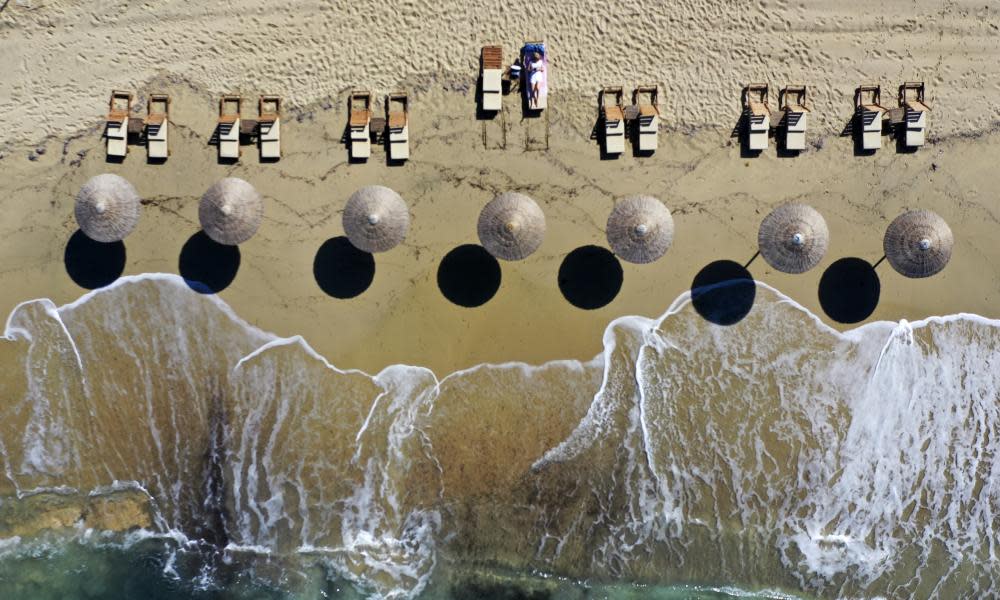‘Americans are heaven for us’: the surge in US visitors throwing Greece a lifeline

A fresh wind blows down Adrianou. Seated in front of his rug store on the street that cuts through the heart of ancient Athens, Theo Iliadis takes in the scene. At 47, he’s seen “a lot of bad stuff” in recent years. The global pandemic couldn’t have come at a worse time for Greece, already gutted by prolonged economic crisis.
But barely a month after the tourist-dependent country opened its doors, the entrepreneur is in ebullient mood. There’s a glint in his eye and a lightness in the air of the carpet-stacked cavern behind him. “Americans are in town,” he smiles. “Business is good, the loom is good and I’ve got drinks on ice.”
Iliadis has every reason to feel content. US tourists think nothing, he says, of spending “up to €15,000” on old tribal rugs, carpets and kilims. “They appreciate hand-made work and they’re great spenders.”
Confounding predictions, Greece is experiencing a recovery of its heaviest industry – tourism – thanks to an unexpected surge in visitors from the US. Few would have predicted it this time last year when lockdowns made Europe a distant dream, but in the shadow of the Acropolis last week it was Americans who were taking advantage of Athens’s determination to kick off the season.
“I’ve been coming here for years but never has there been a direct flight from Chicago,” says Carin Silkaitis who heads the theatre department at Chicago’s Columbia College. “When I saw it online I said, ‘We’re going’,” she enthuses,enjoying a glass of Iliadis’s local firewater – a drink he gamely describes as “milk of the tiger” – after venturing into the store. “It was a huge plane and very full – everyone is feeling the itch to travel after being cooped up for so long.”
To meet demand, more direct daily flights to Greece from the US have been inaugurated than at any other time. The Greek tourism minister, Haris Theoharis, says that 10 airlines, including nine US carriers, are adding Athens to their route schedules as vaccination rollouts drive a rebound in commercial air travel.
Theoharis describes the American recovery as huge compared with other parts of Europe, calling it a reward for a tourism revival based as much on the nation’s relatively successful handling of Covid-19 as strategic planning. With a total of 413,000 coronavirus cases so far, infection rates have been lower than on most other parts of the continent.
“We branded Greece as a safe destination and we said we would open on 14 May, he said. “We didn’t change dates. It was unequivocal. The message was clear.”
US-Greek relations have never been as good, diplomatically or militarily, which has further enhanced cooperation. Theoharis has spent much of the past six months on a plane himself as part of an aggressive bid to promote Greece by a pro-business government acutely aware of the sector’s phenomenal contribution to GDP. At over 20% of national outlay, tourism accounts for one in five jobs.
The decision to launch so many non-stop flights to Athens followed trips to Atlanta, Chicago and Dallas, hub cities for airlines that now have the Greek capital on their route schedule. “More than 40% of all seats on these flights have already been sold. Recovery is somewhere around 50% [in the American market] on 2019,” he said, referring to the last pre-pandemic year when the Mediterranean hotspot attracted a record 33.1 million visitors. Of that number, more than three million were holidaymakers from the UK.
In Greece to celebrate their 10th wedding anniversary, Silkaitis and her wife, Chrissy, have an itinerary typical of many of their compatriots. After Athens they’ll head to Nafplion, the picturesque town in the Peloponnese, before visiting the ever-popular Cycladic islands of Naxos and Santorini. “We had thought of going to London, but Greece made it so much easier,” says the red-haired professor, an actor by profession.
“In England, we had to quarantine and take tests. For Greece, we were told if you can prove you’re fully vaccinated and fill out the [country’s] passenger locator form, you’ll be free to enter. And it was exactly like the Greek consulate in Chicago said,” she laughs clicking her fingers. “After a nine-and-a half hour flight we were in Athens. Everyone was so helpful. There were multiple lanes at the airport, we showed them the forms and were rushed through.”
The couple don’t hide that consulate officials also encouraged them to travel, saying: “Greece needs you, the economy needs you, spend, spend, spend.”
Theoharis concedes that without arrivals from Britain, the nation’s main source market after Germany, Athens will still find it hard to salvage the season. “There is no way without the UK market it could even be a qualified success,” he sighs, adding that with Covid cases having “dropped dramatically” it was hoped the amber-listed destination would soon be put on London’s quarantine-free list.
Still, it is “the American factor” that even smaller Greek hotels are depending on this year. Up in the hills outside Napflion, the proprietors of Perivoli, a country retreat nestled between olive trees and rugged hills, say they have had more bookings than at any other time from the US. Reservations have even come in for November from visitors keen to see Mycenae and other archaeological sites near the hotel. “Americans are heaven for us,” says Alekos Kastrinos, one of the co-owners, listing attributes that include friendliness, openness and a propensity to tip generously.
“They are welcome to our country. They’ll leave their money and this will be very helpful for us after this disastrous coronavirus and the economic crisis. They’re a godsend.”

 Yahoo News
Yahoo News 
